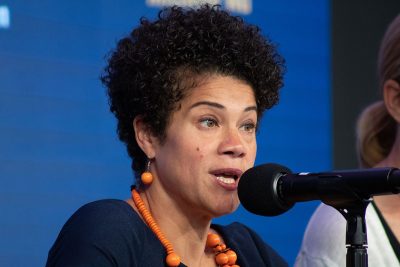
Boston City Councilor At-Large Julia Mejia and District 7 City Councilor Tania Anderson filed a proposal Feb. 2 to create a commission that would assess the effects of long-term racism in Boston.
The proposal aims to create a 15-member commission that will collect data on historic inequities, explore possible reparations and produce a report for the Mayor’s Office in two year’s time with the findings, among other responsibilities.
The proposal, according to Mejia, seeks to start a process of reparations by not only addressing harms committed in the past but also “create a future for generations to come.”
“From the school-to-prison pipeline to the disparities in homeownership to the economic segregation in our city, we are living through an age that has been shaped by structurally racist systems that need to be addressed and ultimately dismantled through a reparative justice lens,” Mejia wrote in an email.
Anderson said her background as an African immigrant informed her decision to join Mejia in the proposal.
“I am not an indigenous African American person, but I am someone who understands that I am an extension to that or that I’m connected to them in a way that I respect their experience,” Anderson said.
The history of reparations could be traced back to 1988 when late Massachusetts Senator Bill Owens advocated for the state to create a commission to look into redressing harm done to African American descendents of the slave trade.
Kevin Peterson, founder of The New Democracy Coalition, said Boston is “one of the most racist cities in the country” and listed some of the disparities between white and Black Bostonians — such as the gaps in healthcare, networth, educational achievement and mortality rates, attributing them to the legacy of slavery.
“It is extremely important that the city of Boston offer an apology to Black Bostonians for its willful complicity in the transatlantic slave trade,” Peterson said. “Without acknowledging its role in the slave trade, Boston cannot in any authentic ways move toward addressing the issue of racial repair and ultimately, reconciliation.”
As of 2015, the net worth of a median white household in Boston was $247,500 while that of a medium black household amounts to $8, according to a report by the Federal Reserve Bank of Boston.
Peterson said the push to create the commission originated from grassroots efforts by community organizations, adding he had been invited to be on the reparations commission.
Anderson said she acknowledges there might not be widespread support for reparations.
“It’s important that those who are opposing it, or who will later be in opposition, do their own research and that they are open to understanding the study properly before making judgments,” Anderson said.
She added being an ally means letting African Americans lead the way, adding those discussing the proposal are inheriting and benefiting from “the resilience and fight” of African Americans.
“We should respect it, we should support the efforts and we should ally ourselves with the African American people with the understanding that they are at the forefront that they should benefit from whatever comes out of a reparations commission,” Anderson said.






















































































































